跨文化交际中的语用失误与避免方法
- 格式:pdf
- 大小:178.33 KB
- 文档页数:5
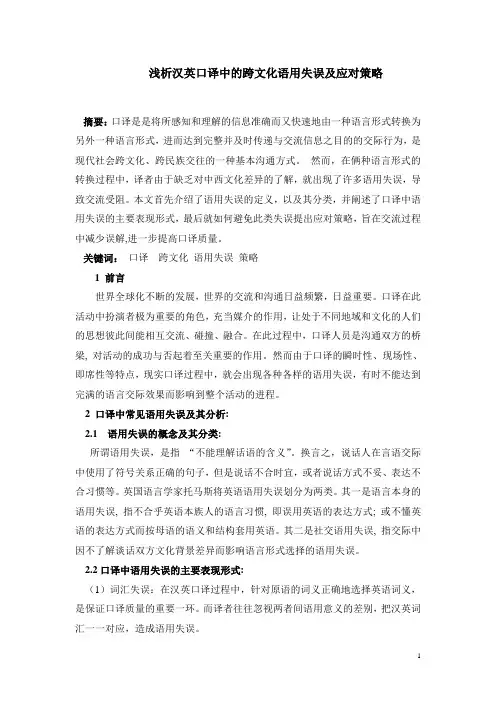
浅析汉英口译中的跨文化语用失误及应对策略摘要:口译是是将所感知和理解的信息准确而又快速地由一种语言形式转换为另外一种语言形式,进而达到完整并及时传递与交流信息之目的的交际行为,是现代社会跨文化、跨民族交往的一种基本沟通方式。
然而,在俩种语言形式的转换过程中,译者由于缺乏对中西文化差异的了解,就出现了许多语用失误,导致交流受阻。
本文首先介绍了语用失误的定义,以及其分类,并阐述了口译中语用失误的主要表现形式,最后就如何避免此类失误提出应对策略,旨在交流过程中减少误解,进一步提高口译质量。
关键词:口译跨文化语用失误策略1 前言世界全球化不断的发展,世界的交流和沟通日益频繁,日益重要。
口译在此活动中扮演者极为重要的角色,充当媒介的作用,让处于不同地域和文化的人们的思想彼此间能相互交流、碰撞、融合。
在此过程中,口译人员是沟通双方的桥梁, 对活动的成功与否起着至关重要的作用。
然而由于口译的瞬时性、现场性、即席性等特点,现实口译过程中,就会出现各种各样的语用失误,有时不能达到完满的语言交际效果而影响到整个活动的进程。
2 口译中常见语用失误及其分析:2.1 语用失误的概念及其分类:所谓语用失误,是指“不能理解话语的含义”。
换言之,说话人在言语交际中使用了符号关系正确的句子,但是说话不合时宜,或者说话方式不妥、表达不合习惯等。
英国语言学家托马斯将英语语用失误划分为两类。
其一是语言本身的语用失误, 指不合乎英语本族人的语言习惯, 即误用英语的表达方式; 或不懂英语的表达方式而按母语的语义和结构套用英语。
其二是社交语用失误, 指交际中因不了解谈话双方文化背景差异而影响语言形式选择的语用失误。
2.2口译中语用失误的主要表现形式:(1)词汇失误:在汉英口译过程中,针对原语的词义正确地选择英语词义,是保证口译质量的重要一环。
而译者往往忽视两者间语用意义的差别,把汉英词汇一一对应,造成语用失误。
如:我很长时间没收到她的来信了。
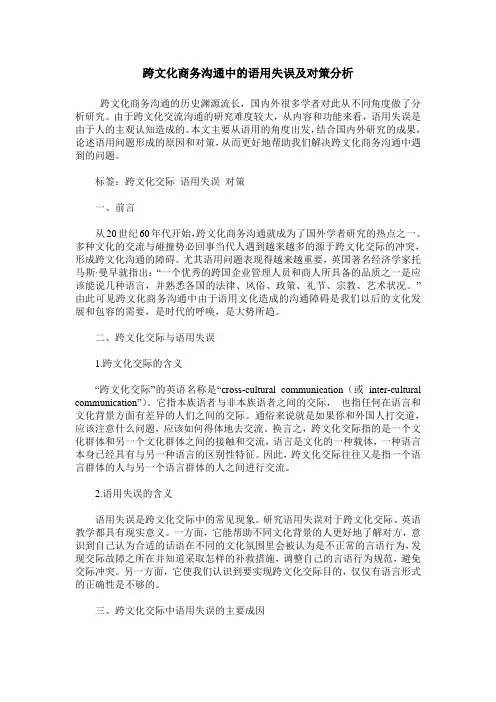
跨文化商务沟通中的语用失误及对策分析跨文化商务沟通的历史渊源流长,国内外很多学者对此从不同角度做了分析研究。
由于跨文化交流沟通的研究难度较大,从内容和功能来看,语用失误是由于人的主观认知造成的。
本文主要从语用的角度出发,结合国内外研究的成果,论述语用问题形成的原因和对策,从而更好地帮助我们解决跨文化商务沟通中遇到的问题。
标签:跨文化交际语用失误对策一、前言从20世纪60年代开始,跨文化商务沟通就成为了国外学者研究的热点之一。
多种文化的交流与碰撞势必回事当代人遇到越来越多的源于跨文化交际的冲突,形成跨文化沟通的障碍。
尤其语用问题表现得越来越重要,英国著名经济学家托马斯·曼早就指出:“一个优秀的跨国企业管理人员和商人所具备的品质之一是应该能说几种语言,并熟悉各国的法律、风俗、政策、礼节、宗教、艺术状况。
”由此可见跨文化商务沟通中由于语用文化造成的沟通障碍是我们以后的文化发展和包容的需要,是时代的呼唤,是大势所趋。
二、跨文化交际与语用失误1.跨文化交际的含义“跨文化交际”的英语名称是“cross-cultural communication(或inter-cultural commu nication”)。
它指本族语者与非本族语者之间的交际,也指任何在语言和文化背景方面有差异的人们之间的交际。
通俗来说就是如果你和外国人打交道,应该注意什么问题,应该如何得体地去交流。
换言之,跨文化交际指的是一个文化群体和另一个文化群体之间的接触和交流,语言是文化的一种载体,一种语言本身已经具有与另一种语言的区别性特征。
因此,跨文化交际往往又是指一个语言群体的人与另一个语言群体的人之间进行交流。
2.语用失误的含义语用失误是跨文化交际中的常见现象。
研究语用失误对于跨文化交际、英语教学都具有现实意义。
一方面,它能帮助不同文化背景的人更好地了解对方,意识到自己认为合适的话语在不同的文化氛围里会被认为是不正常的言语行为,发现交际故障之所在并知道采取怎样的补救措施,调整自己的言语行为规范,避免交际冲突。

论跨文化交际中的言语行为失误随着全球化的加速和全球交流的不断深入,跨文化交际已成为人们生活中不可避免的现象。
然而,在跨文化交际中,由于不同文化之间存在着巨大的差异,因此,言语行为失误也随之出现。
本文将从定义、原因、影响及应对措施四个方面,深入探讨跨文化交际中的言语行为失误。
一、定义言语行为失误是指在进行跨文化交际时,由于语言、文化等方面的差异,造成的不恰当的语言行为,如语言上的错误、使用语气不当、使用不恰当的词汇等。
二、原因跨文化交际中的言语行为失误主要有以下原因:1.语言差异:不同国家和地区的语言系统和语言文化差异很大,会使交际者在使用语言时产生概念、语音、语法等方面的误解。
2.文化差异:不同文化中存在着不同的习俗、文化传统、价值观念等,这使得交际者在进行跨文化交际时不可避免地会产生文化障碍。
3.经验不足:初次接触对方文化的交际者,无法准确地理解对方语言和文化,也容易导致言语行为失误。
三、影响跨文化交际中的言语行为失误会对交流双方产生以下影响:1.阻碍沟通:言语行为失误会导致交流的不顺畅,阻碍有效的沟通。
2.增加误解:言语行为失误会导致双方产生误解,误解的产生会使情况变得更加尴尬。
3.伤害感情:不当的言语行为会使人感到不快、冷落和厌倦,从而伤害彼此的感情。
4.失去机会:言语行为失误会让人失去机会,如在商务洽谈中,不当的言语行为可能会导致合作失败。
四、应对措施为了有效地处理跨文化交际中的言语行为失误,我们需要采取以下应对措施:1.加强语言学习:要有效避免语言上的误解和不当言行,交际者需要学习对方的语言和文化。
2.提高文化意识:了解对方文化,避免在文化方面犯错,开展文化交流,建立文化共识和理解。
3.多加沟通:在进行跨文化交际时,要注意多加沟通,向对方表达自己的想法和观点,以避免产生歧义和不必要的误解。
4.正确处理失误:当出现语言行为失误时,要冷静处理,尽量减少误解和冲突,寻找解决方案。
在跨文化交际中,言语行为失误是不可避免的,交际者应该掌握正确的应对策略,积极学习对方的语言和文化,增强文化意识,加强沟通交流,以达到沟通交流的最佳效果。

跨文化交际中语用失误的分析和规避方法随着国际交流的日益频繁,跨文化交际作为一门新兴学科,越来越受到人们的关注。
语言学习其实就是语言学习的文化,最终目的是交流。
本文主要讨论了跨文化交际中的语用失误,并分析了语用失误的原因。
一、引言由于不同的历史渊源和社会习俗,不同的国家和民族形成了特定的文化背景,而特定的文化背景又形成了不同的价值观、思维方式、社会规范和语用规则。
这些因素会导致跨文化交际中的交际障碍、交际低效、相互误解以及可能的文化冲突,给交际者带来不必要的麻烦。
掌握基本的语言技能仅仅意味着表达,而真正的交流涉及到很多沟通问题。
交流的目的是让听者理解他们所表达的意思和思想,而不是他们说了什么。
因此,分析跨文化交际中的语用失误具有研究的价值和意义,分析语用失误的原因有助于促进跨文化交际。
二、语言、文化与跨文化交际语言是文化的一部分,语言和文化相互影响、相互作用:要理解语言,就要理解文化,要理解文化,就要理解语言。
由于文化和语言的差异,沟通和交流并不容易,不同文化背景的人在交流中往往会遇到困难。
不同文化背景、不同语言的人在交谈时经常会出现交际失误。
跨文化交际是指本族语者和非本族语者之间的交际;它也指不同语言和文化背景的人之间的交流。
例如,在中国的母语为汉语的人和美国的母语为英语的人的交流中,由于价值观、习俗、思维模式等的差异。
,在交际中何时何地该说什么,不该说什么,对不同的受众说什么,都是交际中应该注意的问题。
三、跨文化交际中语用失误现象在跨文化交际中,如果听话人所感知的话语意义与说话人所要表达的意义不同,这时就产生了语用失误。
jenny thomas把跨文化交际中的语用失误划分为语用语言失误和社会语用失误。
语用语言失误指学习者将本族语对某一词语或结构的语用意义套用在外语上造成的语用失误;社交语用失误指由于文化背景不同而造成的语用错误,涉及到哪些该讲,哪些不该讲,人际关系的远近,人们的权利和义务等,与人们的价值观有关。

跨文化交际中的语用失误及其应对策略随着全球化的发展和经济的全球化趋势,跨文化交际已经成为了一个非常重要的话题。
在跨文化交际中,语言是非常重要的工具,而语言中的语用也是一个非常重要的方面。
然而,由于不同的文化背景和语言背景之间的差异,跨文化交际中经常会发生语用失误。
本文将探讨跨文化交际中的语用失误及其应对策略。
一、语用失误的概念语用失误是指在跨文化交际中,由于不同的文化背景和语言背景之间的差异,使用不当的语用规则和习惯而导致的语言行为的不适当或无效。
语用失误可以参照Grice的合作原则进行研究。
合作原则是指在语言交际中,人们都有一个合作的目的,可以通过遵守一些基本原则来达到这个目的。
其中最重要的原则是:说话人应该说出真实的、相关的、明确的、完整的信息,听话人应该理解说话人的意图,不破坏交际双方的合作意愿。
在跨文化交际中,有时人们不知道如何遵守合作原则,就会发生语用失误。
二、语用失误的例子1、称呼和称谓的不当使用在不同的文化中,对于称呼和称谓的使用有着不同的规定。
在中国,我们通常会用称呼加姓氏来表示尊敬。
例如,我们会称呼老师为“张老师”,长辈为“张叔叔”或“张阿姨”。
然而,在西方国家,称呼和称谓的使用是非常严格的。
比如,在美国,称呼老师应该使用“先生”、“女士”或姓氏的缩写,而不是称呼张老师为“张先生”。
如果不知道这些规则,那么就很容易出现语用失误。
2、基于不同文化习俗的礼貌用语的误用礼貌用语在不同的文化中也是有很大的差异的。
在日本,人们通常用“ありがとうございます”表示感谢,而在西方国家,人们则会用“Thank you”表示感谢。
如果在跨文化交际中使用了不当的礼貌用语,就会出现语用失误。
3、基于不同文化习俗的非语言行为的误解在不同的文化中,非语言行为的习俗也是有很大的差异的。
比如,在中国,人们通常会给送别的人手中塞一些东西,以表达祝福和感谢之情。
然而,在西方国家,人们则会用拥抱和亲吻来表示感情。
如果在跨文化交际中,把这些非语言行为的习俗用错了,就会出现语用失误。
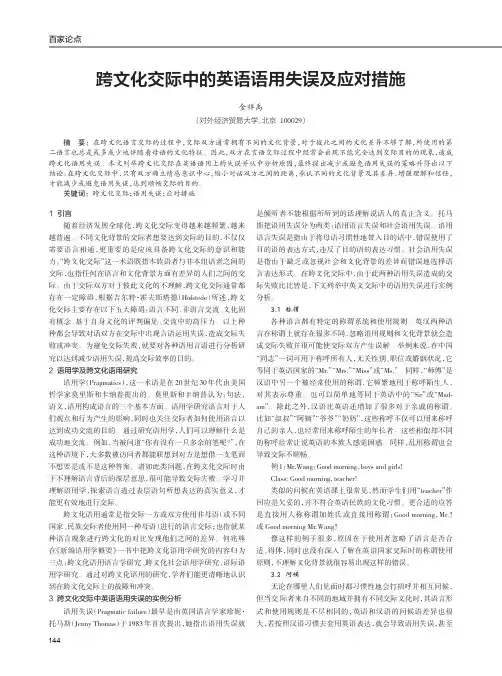
百家论点跨文化交际中的英语语用失误及应对措施金祥禹(对外经济贸易大学,北京100029)摘要:在跨文化语言交际的过程中,交际双方通常拥有不同的文化背景,对于彼此之间的文化差异不够了解,所使用的第二语言也总是或多或少地伴随着母语的文化特征。
因此,双方在言语交际过程中经常会出现不能完全达到交际目的的现象,造成跨文化语用失误。
本文列举跨文化交际在英语语用上的失误并从中分析原因,最终提出减少或避免语用失误的策略并得出以下结论:在跨文化交际中,只有双方确立情感意识中心,缩小对话双方之间的距离,承认不同的文化背景及其差异,增强理解和信任,才能减少或避免语用失误,达到顺畅交际的目的。
关键词:跨文化交际;语用失误;应对措施1引言随着经济发展全球化,跨文化交际变得越来越频繁,越来越普遍。
不同文化背景的交际者想要达到交际的目的,不仅仅需要语言相通,更重要的是应该具备跨文化交际的意识和能力。
“跨文化交际”这一术语既指本族语者与非本组语者之间的交际,也指任何在语言和文化背景方面有差异的人们之间的交际。
由于交际双方对于彼此文化的不理解,跨文化交际通常都存在一定障碍,根据吉尔特·霍夫斯塔德(Hofstede)所述,跨文化交际主要存在以下五大障碍:语言不同、非语言交流、文化固有概念、基于自身文化的评判偏见、交流中的高压力。
以上种种都会导致对话双方在交际中出现言语运用失误,造成交际失败或冲突。
为避免交际失败,就要对各种语用言语进行分析研究以达到减少语用失误,提高交际效率的目的。
2语用学及跨文化语用研究语用学(Pragmatics),这一术语是在20世纪30年代由美国哲学家莫里斯和卡纳普提出的。
莫里斯和卡纳普认为:句法,语义,语用构成语言的三个基本方面。
语用学研究语言对于人们观点和行为产生的影响,同时也关注交际者如何使用语言以达到成功交流的目的。
通过研究语用学,人们可以理解什么是成功地交流。
例如,当被问道“你有没有一只多余的笔呢?”,在这种语境下,大多数被访问者都能联想到对方是想借一支笔而不想要是或不是这种答案。

跨文化交际中的语用失误以及有效应对策略摘要:随着中国改革开放程度的逐渐深入,跨国域、跨民族、跨文化的经济和社会交往与日俱增,不同国家和地区的人们在相互交往的过程中不可避免地会出现文化冲突现象。
语用失误不是来自语言本身的语法错误,而是说话人用词不当或听话人误解了说话人的意图所致。
更多的语用失误则是由于谈话双方不了解对方的文化背景、风俗、禁忌、价值观念等造成的。
通过对跨文化交际中常见的语用失误进行分析,提出了减少语用失误的对策。
关键词:跨文化交际;语用失误;文化一、跨文化交际与语用失误跨文化交际是指不同文化背景的人们之间的交际活动。
人进行言语交往时都要受到文化背景的影响,交际双方的交流就是依赖于两种文化背景的人运用不同的语言进行交往。
当编码与解码不在同一语言文化模式下进行,这种跨文化交际就会形成不同形式的语用失误。
在人们的言语交际中,因未达到完满的交际效果而出现的差错,统称为“语用失误”。
在这里,我们不用“错误”,而是采用“失误”这一说法,这是因为,语言失误并不是语言本身的语法错误所引起的,它不是因语法结构出现错误而导致的词不达意。
语用失误是说话人采取的说话方式不合时宜或者不符合表达习惯。
根据英国著名语言学家jenny tommas的观点,可以将语用失误分为两种:语用语言失误和社交语言失误。
它们均是跨文化语用学的重要组成部分。
顾名思义,语用语言失误是因不同语言之间的差异和它们之间的影响所引起的,很多情况下,这种失误也应归因于母语对第二语习得过程中的干扰。
而社交语言失误是由不同语言所依赖的文化背景差异或者社交文化习惯引起的,这就是说,当说话者对对方缺乏文化了解,情急之下,运用母语的文化习惯进行会话就会形成语用失误。
二、跨文化交际中语用失误的表现及其产生的原因1.跨文化交际中语用失误的表现(1)语用语言失误语用语言失误指的是由于外语学习者不懂得目的语的语言习惯,而把母语的语言习惯运用到目的语中,而造成表达的不准确,例如:a:thank you very much.b:never mind.在上述的对话中,b用“never mind”来表达不用谢的意思是不对的,当我们对对方道歉时表示不介意时才会用“never mind”。

跨文化交际中的语用失误分析在全球化日益加剧的今天,跨文化交际能力已成为人们不可或缺的一项技能。
然而,在实际的跨文化交际过程中,语用失误时常出现,成为交际中的一大障碍。
本文将探讨跨文化交际中语用失误的重要性,分析其表现形式、产生原因以及如何应对这一挑战。
在跨文化交际中,语用失误指的是由于语言使用不恰当或不合适,导致信息传递不畅或者交际失败。
这种失误可能源于语言使用者的文化背景、思维方式、价值观念等方面与目标语言使用者的差异。
例如,英语国家的人普遍重视个体主义和直接性,而东方文化则更注重群体主义和婉转含蓄。
在跨文化交际中,如果使用过于直接或者过于婉转的语言,都可能导致语用失误。
语用失误在跨文化交际中有很多表现形式。
语言选择不当是常见的一种。
例如,使用不礼貌的语言或者过于专业的术语,都会让对方感到不舒服或者困惑。
语境偏移也是语用失误的一种表现。
在某些语境下,使用不恰当的语言或者表达方式,可能导致误解或者沟通失败。
表达方式的不同也是引起语用失误的一个重要因素。
不同文化背景下的人有不同的沟通风格和礼仪习惯,如果不能很好地适应对方的沟通方式,也容易导致语用失误。
语用失误的产生原因有很多,其中最主要的是文化差异。
不同的文化背景会造就人们不同的思维方式、价值观念和行为习惯。
如果不能很好地了解并尊重对方的文化,就很容易在跨文化交际中出现语用失误。
语言习惯也是导致语用失误的重要因素。
不同语言习惯的人有不同的表达方式和沟通技巧,如果不能很好地适应对方的语言习惯,也容易导致语用失误。
社会压力也是语用失误产生的原因之一。
在某些情况下,由于对对方的文化和社会环境不够了解,或者由于对自己的语言能力不够自信,人们往往会在跨文化交际中产生一定的社会压力,这种压力可能会导致语用失误。
让我们来看一个例子。
在电视剧《北京遇上西雅图》中,由于男主角Frank是美国人,而女主角文佳佳则是中国人,两人在交流过程中就出现了很多语用失误。
例如,Frank经常直接表达自己的想法和观点,而文佳佳则更喜欢用一些含蓄的方式表达自己的意见。
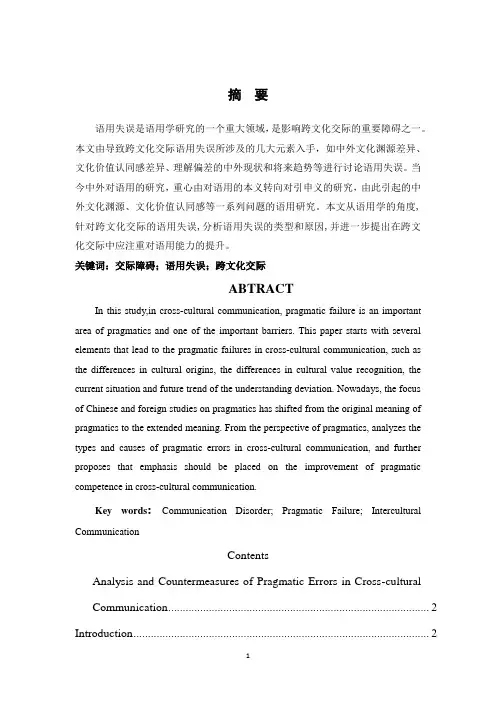
摘要语用失误是语用学研究的一个重大领域,是影响跨文化交际的重要障碍之一。
本文由导致跨文化交际语用失误所涉及的几大元素入手,如中外文化渊源差异、文化价值认同感差异、理解偏差的中外现状和将来趋势等进行讨论语用失误。
当今中外对语用的研究,重心由对语用的本义转向对引申义的研究,由此引起的中外文化渊源、文化价值认同感等一系列问题的语用研究。
本文从语用学的角度,针对跨文化交际的语用失误,分析语用失误的类型和原因,并进一步提出在跨文化交际中应注重对语用能力的提升。
关键词:交际障碍;语用失误;跨文化交际ABTRACTIn this study,in cross-cultural communication, pragmatic failure is an important area of pragmatics and one of the important barriers. This paper starts with several elements that lead to the pragmatic failures in cross-cultural communication, such as the differences in cultural origins, the differences in cultural value recognition, the current situation and future trend of the understanding deviation. Nowadays, the focusof Chinese and foreign studies on pragmatics has shifted from the original meaning of pragmatics to the extended meaning. From the perspective of pragmatics, analyzes the types and causes of pragmatic errors in cross-cultural communication, and further proposes that emphasis should be placed on the improvement of pragmatic competence in cross-cultural communication.Key words: Communication Disorder; Pragmatic Failure; Intercultural CommunicationContentsAnalysis and Countermeasures of Pragmatic Errors in Cross-cultural Communication (2)Introduction (2)Chapter I (7)Theoretical Basis (7)1.1.Theoretical Basis (7)2.1. Language pragmatic failure (8)2.2Social pragmatic failure (10)2.3. Non-verbal pragmatic failure (13)Chapter III (16)The cause analysis of pragmatic failure and strategies for Pragmatic Failures in Cross-cultural Communication (16)Conclusion (19)The solution study of Pragmatic Failures in Cross-cultural Communication (19)IntroductionPragmatic errors caused by the differences of various elements in cross-cultural communication have become a serious problem. Due to the fact that each country does not understand the cultural characteristics of native English speakers and non-native speakers, and there are differences in their beliefs, cultural value recognition and understanding, pragmatic errors occur in cross-cultural communication. Therefore, it is increasingly important to study pragmatic errors in cross-cultural communication. Expression in communication, use of vocabulary, sentence and culture value identity subtle difference also can cause communication barriers, in cross-cultural communication, we are no longer simply to express literal meaning, must be combined with the other person's social status, cultural background and environment, through a series of accurate analysis, the correct expression and understanding the true meaning of the speaker. Based on this theory, the study of pragmatics focuses on the cultural value recognition and understanding. With the development of linguistics, pragmatic errors have gradually become a hot topic among scholars. Languages have been formed for thousands of years, and their statusis not easily shaken. However, due to various cultural backgrounds, they all have fixed language structure and logical thinking. Pragmatics scholars believe that in communication, even if the speaker USES the correct and standard grammar, the deviation of the way of expression and the neglect of the cultural background and social rules can lead to communication barriers, which leads to pragmatic failure.Nowadays many scholars found the original meaning and metaphorical meaning of the study of foreign language that focus on both sides of the subject and the culture origin of differences, as well as the difference between Chinese and foreign cultural value identity understanding deviation, for us to study of pragmatic failure in cross-cultural communication pointed out the direction. However, their research is only limited to the description on the surface of language and does not focus on pragmatic errors. Now, on the basis of Jenny Thomas' classification, scholars classify pragmatic errors into pragmatic language errors and social pragmatic errors. In cross-cultural communication, the verbal expression fails to achieve the desired effect of the target language, or the structure of the mother tongue is created, and inappropriate verbal expression leads to misunderstanding and communication barriers. Social pragmatic error refers to the pragmatic error caused by the misunderstanding of the cultural background of the other party in communication. The pragmatic failures in cross-cultural communication can be analyzed from their respective beliefs, cultural value identity and understanding. Some differences between English-speaking countries and Chinese in these aspects. English-speaking countries pay great attention to the pursuit and sublimation of personal values, especially the protection of personal privacy. Therefore, it can be known that in the communication of English speaking countries, such as marriage status, children, actual age, salary, religion, etc., are private and are forbidden to be asked. However, in China, tolerance is great, and people pay attention to the harmony and friendship between people and all things in the world. So the Chinese are more collectivist. In addition, English-speaking countries also have different time control. English-speaking countries more unknown's vision of the time, but the Chinese culture under the edification of the Chinese pay more attention to the history ofexploration, in the history of Chinese pay more attention to hierarchical, and junior to his birthright, and the English-speaking countries pay attention to equality, it also makes people to say in communication, taboo language and euphemism and politeness language is different. In the long run, the differences in understanding of language habits lead to pragmatic errors and hinder the smooth progress of communication.However, according to the cross-cultural pragmatic failures redefined in this thesis, the cross-cultural pragmatic failures should be divided into three categories: pragmatic, social and nonverbal pragmatic failures. The former two belong to the verbal level and the latter to the non-verbal auxiliary level. It provides a new perspective for further analysis and countermeasures of pragmatic errors in cross-cultural communication.People living in a common society are bound to abide by social rules. Social rules are norms that regulate people's behavior in society, including cultural background, cultural value identity, religious belief and other factors. There is an old saying: "no rules, no radius." Social rule is a constraint mechanism to regulate society, and it is a criterion to regulate social behavior that can be recognized by the whole society gradually formed by people in the society in the long-term historical background. In other words, without the existence of social rules, all social activities and social existence are difficult to unify activities. We violate social rules, according to the degree of violation, will be punished by the world, both social criticism, punishment, even legal sanctions. People have to follow certain social rules and follow them naturally.As an important part of society, speech is bound to be subject to certain social rules.Just as people's expression must follow social rules, people's speech expression must follow the rules of usage Shared and created by society, that is, the rules of social language. Social language rules belong to the category of social rules in cross-cultural communication. Just as it is natural for people to follow the social norms, the verbal expression is also the observance of the rules of social language, as well as the recognition of cultural value naturally generated after they understand the cultural background of various countries and communicate with thelanguage rules of various countries. As there are differences in social rules, there must be differences in social language rules, which leads to differences in cross-cultural communication. Due to the influence of many factors, the differences become more and more severe, which will be disastrous if it is ignored in the context of today's globalization. We tend to only pay attention to the learning of grammatical structures and ignore the understanding of logical thinking and cultural background. Between different cultures is not only reflected in the pragmatic language failure refers to the pragmatic meaning in the context of a particular language make communication both sides understand the deviation caused by error, specific as phonetics, vocabulary, grammar mistakes of words, but also in social pragmatic failure and even pragmatic failures in cross-cultural nonverbal communication in auxiliary language, body posture, object object language, etc., including communication, communication, communication error. It is urgent to study pragmatic failure.People of different cultures in communication often understanding deviation or not meet expectations, such as their don't know the culture of native English speakers and between non-native characteristic, follow each other beliefs, cultural values, identity and understand the differences between the differences with the social language rules caused by lacking of awareness of cross-cultural communication breakdown, linguists called pragmatic failures.And with these words with science research community in order to smooth progress of communication all over the world, has started the study of pragmatics, and the term "pragmatic failure" began in the British linguist Jenny Thomas (1983), and the pragmatic failure into linguistic pragmatic failure and social pragmatic failure, points out that "as long as the perception by the speaker's discourse with the speaker intends to express or think should be obedient people perceived meaning is different, then creates a" pragmatic failures. He Ziran(1997) believes that "pragmatic failure is not the linguistic failure in general diction and sentence construction, but the failure in speaking out of turn, or the improper way of speaking or expression out of habit.The existing definition of Thomas and He Ziran only studies the verbal errors and ignores the importance of non-verbal AIDS. Verbal expression accounts for about one-third of verbal communication, and the remaining two-thirds is done with nonverbal assistance. Therefore, the existing pragmatic errors should be redefined as: in cross-cultural communication, one of the communicating parties is called pragmatic errors because of the misunderstanding caused by the verbal and non-verbal AIDS. Pragmatic failures can be divided into pragmatic and social pragmatic failures. Language pragmatic failure lies only in the language itself, the native language speakers live move hard stretched out the form structure, in the desire to express the meaning but not the pragmatic failures caused by clear of her intention, is due to express the original meaning of language and word meaning understanding deviation caused, often characterized by semantics, grammar, structure, expression of pragmatic failure, this also caused the social pragmatic failures. However, according to the cross-cultural pragmatic failures redefined in this paper, the cross-cultural pragmatic failures should be divided into three categories: pragmatic, social and nonverbal pragmatic failures. The former two belong to the verbal level and the latter to the non-verbal auxiliary level. It provides a new perspective for further analysis of Chinese students' misunderstanding in cross-cultural communication ,This thesis mainly adopts the literature research method to study the views of scholars on pragmatic errors.Taking pragmatic failures as the focus of pragmatics research, scholars' research shows that the study of language culture learning and background is no longer just the study of language learning, but the study of the ultimate purpose of pragmatic failures and the development direction of pragmatic failures. By means of discussion and practical verification, linguists have shown how to reasonably express their own words so that both sides can achieve the desired effect. By analyzing the understanding deviation caused by pragmatic failure, linguists have analyzed the relationship between discourse communication and cultural background. Different cultural backgrounds lead to different communication modes. There are also studies on language strategies that affect cross-cultural communication errors, and show howhuman verbal communication develops and what factors restrict human communication, which plays a very important role in our study of pragmatic errors.The first chapter introduces the background and current situation of the research, the purpose and significance of the research, the research methods and the structure of the paper.The second chapter introduces relevant theoretical research and theoretical basis.The third chapter introduces the types of pragmatic failures,The fourth chapter analyzes the causes of pragmatic failures, The fifth chapter summarizes the pragmatic failures.Chapter ITheoretical Basis1.1.Theoretical BasisThomas and definition of pragmatic failure, this article studies verbal pragmatic failures, the British linguist Jenny Thomas (1983) for further study of pragmatic failures, and the pragmatic failures can be divided into linguistic pragmatic failure and social pragmatic failure and points out that the speaker of words do not tally with the anticipated effect to make each other understand deviation cause pragmatic failure. He Ziran (1997) holds that pragmatic errors are not only linguistic errors, but also improper expression errors. However, the importance of non-verbal assistance has been gradually valued by the broad masses, which is defined as: one party of the two sides of communication is called pragmatic failure because of the misunderstanding of the other party caused by verbal expression and non-verbal assistance. Pragmatic failures can be divided into pragmatic and social pragmatic failures. Languagepragmatic failure lies only in the language itself, the native language speakers live move hard stretched out the form structure, in the desire to express the meaning but not the pragmatic failures caused by clear of her intention, is due to express the original meaning of language and word meaning understanding deviation caused, often characterized by semantics, grammar, structure, expression of pragmatic failure, this also caused the social pragmatic failures.Chapter II2.Main Types of Pragmatic Errors in Cross-culturalCommunication2.1. Language pragmatic failurePragmatic language failure refers to the errors caused by the misunderstanding of the pragmatic meaning of language in a specific context, which include errors in pronunciation, vocabulary and grammar. Due to the subtle influence of the native culture and the factors of their own learning ability, when learning English pronunciation, they will have an accent, ignore consonants, wrong pronunciations, wrong vowels, and ambiguous stressed syllables, resulting in phonetic errors. V ocabulary is caused by the influence of Chinese language structure which leads to the deviation of English meaning comprehension and the improper use of similar words. Grammar is caused by the confusion of tense and voice in communication. For example, Chinese students and foreign students live together in the dormitory. In themiddle of the night, Chinese students play music. The Chinese students answered, "It's 1 o 'clock at night." obviously, the Chinese students did not understand that the foreign students' specific question meant that they should have gone to sleep quietly instead of listening to music recklessly. Therefore, we must pay attention to the appropriateness of language in language communication. Pragmatic linguistic errors are mainly considered from the perspective of communicative parties.First of all, it is taken for granted that the other side can fully understand their own words, and the improper way of expression leads to pragmatic failure, such as the conversation between English speakers and Chinese.Chinese: Has Marry been set free?English speaker:What happened to her?Here the problem is a typical Chinese style of question sentence structure, and if the Chinese mean free this is Mary, general meaning come to Mary for me to play, but the English country people will think Mary accident of imprisonment its consequences, so in the appropriate context of discourse to combine their cultural background and sentence comprehensive analysis to ensure the smooth progress of communication.Again, such asEnglish speaker: Thank you.Chinese: It is my duty to do It.This is a conversation in which the Chinese accompany the English speakers to the exhibition, the English speakers express their thanks, and the Chinese reciprocate. Thank you for your company. Although the polite response of Chinese people is quite different from the normal humble response in Chinese culture, due to the cultural background of the two sides, the semantics in the speech are quite different. However, according to the normal understanding of the guests, the correct answer should be "It is my pleasure. Because English-speaking people think of "duty" as a greater responsibility and psychological burden is too heavy, contrary to social norms and other meanings, which will be uncomfortable and cause communication barriers.2.2Social pragmatic failureThe social pragmatic failure is that different cultural backgrounds have different views on the appropriate language behavior in a specific context. As a result, English-speaking countries and Chinese people misunderstand the real meaning of their words in the complex social culture, resulting in communication barriers. For example, according to Chinese traditional virtues, respecting the old and caring for the young is a virtue beyond reproach to Chinese students. Anglophone elders, however, see the attention given to her as a sign of old age and distemper, causing difficulties in communication. Differences in cultural background and cultural values lead to this social pragmatic failure. People from different cultural backgrounds may have a wrong understanding of inappropriate speech patterns. Behaviors that are generally accepted in one culture are not recognized or even discarded in another culture. What is appropriate and appropriate to express in one culture is considered naive and ignorant in another culture. These ubiquitous differences in the sense of value identity lead to communication difficulties and obstacles between English-speaking countries and Chinese people. Learners of English are influenced by the logical thinking of their mother tongue in language expression and use English according to the structure of their mother tongue. This deep-rooted cultural atmosphere interferes with our learning of English, which we call negative cultural transfer. The greater the cultural differences between English-speaking countries and Chinese, the greater the negative cultural transfer gap, and the higher the failure rate of pragmatic mistakes. Some typical examples of negative cultural transfer in the failure of social pragmatics, which is one of the important reasons for the failure of cross-cultural communication.Cultural background differences lead to social pragmatic errors in greeting, personal, euphemism, polite language and taboo words.Social pragmatic failures of greeting and person.For exampleA student greets an English-speaking teacher with "Hello ,the teacher John."This kind of pragmatic mistake is a typical mistake in English and Chinese modes. In English countries, we should use Sir, Madam, Mr, Mrs, Miss, Ms and theirsurnames to address each other. We can't use personal occupation as the address. Chinese call teacher Li, doctor Lin, manager Wu and so on. It can be seen that the differences in cultural backgrounds lead to the failure of communication everywhere. There are also privacy issues that English speakers refuse to answer and loathe.And privacy protections for English speakers cannot be ignored."Older?" "From where? "How many people in the family?""what is your occupation?" "how much is your salary?"And so on. Although the Chinese are not willing to answer, but the Chinese will polite polite response, English speakers will directly refuse or even reduce contact. This protection of privacy is also due to cultural differences.The social pragmatic failure of polite language, polite language can make you grasp the right time in communication and praise the other party appropriately to make the communication go smoothly, polite language in the conversation from time to time to use polite words transition dialogue, so that the conversation goes on smoothly. Pragmatic rules are relatively existing and common among countries, but the most important thing is to understand the cultural background of both sides and to restore the appropriateness of language to the greatest extent. Different language structures have similarities and great differences in details, which require the joint efforts of both sides in communication to grasp the similarities of conversation as far as possible to common communication, so that the two sides can communicate smoothly. The two sides of the communication with different cultural backgrounds grasp the use and flexibility of pragmatic rules, and measure the communicative standards and forms of expression.An English-speaking student goes to a Chinese student's home for dinner and says "I can eat all of this food" to show his satisfaction with the food, but the Chinese student thinks there is not enough food for him! If Chinese people invite friends from English-speaking countries to dinner, they always say humbly, "there is no good food to serve, please excuse me until you arrive, please help yourself!" People in English-speaking countries think, "since you invited me to dinner, shouldn't you treat me well? Wouldn't it be better to have a good reception?" It can be seen that theunderstanding of table manners is also very deviated, and the social pragmatics mistakes are not properly grasped, which leads to the departure of the party.Social pragmatic failure of taboo words and euphemism. Taboo words and euphemism are mutually complementary and closely attached to each other. Since there are some taboos, euphemism should be used to avoid them to ensure smooth communication. Taboo words and euphemisms exist in most languages, which are the product of the long-term formation of the society. However, euphemisms are relatively generated from this, enabling people to follow the principle of politeness in their lives, and thus language has broad commonality. In English-speaking countries of "old" euphemism is particularly, mapping in English-speaking countries people taboo "old" social mentality, old man most single life had come to the English countries, sad lonely, so the "old" is a taboo, resulting in English-speaking countries, known as "senior citizens" elderly (an senior citizen), it is stray flower defeated , but euphemistically called hale and hearty. Chinese people more grief, Chinese culture is not to "old" is the taboo, national tradition also has the traditional culture of "respect", the old man most has children to take care of, in the home is "the home has a old if there is a treasure" of say, universal respect and care for, old "in the Chinese culture far from a daunting word, instead it gives a person the sense with a kind of" respected ". People like to use "old" to show respect, love, respect, such as "you old, old gentleman, old cadres, old revolutionary old professor" and so on, these are the title of respect for the elderly, it seems friendly. But this is forbidden in English-speaking cultures. English speakers don't usually call people "old" to their faces, so how old are you? Although it may seem polite, the other person will not like it, because he may think you are laughing at his lack of usefulness. At the same time of language learning, communicative competence is reflected not only in the correctness of the grammatical structure of language, but also in the appropriateness of social pragmatic language.The aim of language learning is to cultivate students with language communication, and the cultivation of communicative ability and cultural background of learning and teaching have a close relationship, when learning a language, if simply learning language syntax and does not include the culture background, not tounderstand the social rules of the language, and cannot accurately, in communication. Let the students enhance their awareness of the culture of English-speaking countries, subtly, improve the understanding of the culture of English-speaking countries, cultivate the sense of cultural value and correct cultural perception.There are a lot of social pragmatic errors in cross-cultural communication, so it is particularly important to study social pragmatic errors, which not only helps to reduce pragmatic errors in cross-cultural communication, but also promotes the effective conduct of cross-cultural communication. Through a concrete analysis of the various manifestations of the study of social pragmatic errors, we can explore the underlying historical causes such as historical formation, cultural values and sense of identity. To understand and analyze the culture of English-speaking countries and improve the understanding of different cultures is also an effective way to reduce social pragmatic errors in communication.For exampleIn China, people may ask one another, "how old are you?What kind of work do you do ?And how much does it pay? "And so on.In the context of China's extensive and profound culture is an appropriate speech act, popular and cordial. But in foreign countries where English is the native language, they pay special attention to privacy protection and inviolability, which will lead to antipathy, and they will directly refuse to answer, thus causing communication barriers.2.3. Non-verbal pragmatic failurePragmatic failures in cross-cultural non-verbal communication are embodied in auxiliary language, body posture and object language and other aspects, including communicative behavior, communicative mode, communicative situation mistakes. Nonverbal communication is to assist and create the right atmosphere so that the speaker can express the meaning of the conversation more accurately. Facial expression is the main expression of communication, while smile is the leading part ofexpression. In the same social situation, people from different cultures have different understandings of smile. For example, if people in English-speaking countries hear the other side of the joke during the meal habit of whispering, low-key and elegant continue to eat. Chinese people, however, laugh and share jokes with those around them to create a harmonious atmosphere. People in English-speaking countries, however, believe that they interfere with other people's normal eating and cause communication problems. For example, when a person makes a mistake, he/she reflects on himself/herself with an expression of guilt and self-reproach, while making a humble and careful apology in his/her tone. In this way, he/she can express his/her guilt in a coherent auxiliary language and express his/her attitude and body with an expression that makes people feel that they are worthy to be taught.Gestures reinforce confidence and courage in the words they are trying to express.For exampleThe speaker say, "we can only succeed in this way."At the same time, the others with their heads up, their bodies straight, their drummers, and their enthusiasm, express their firm ideals and beliefs.Object including gestures, eye, face, expression, atmosphere, etc., can play in the appropriate atmosphere using the appropriate expression make communication smoothly, for example: conversation, people use gestures, eye, posture, and pause tone hint at his words, transition, emphasizing the importance of making words can make each other understand more. It can be seen from this that if we ignore the assistance of non-verbal communication, it will replace the adjustment, emphasis and cooperation of verbal communication. In verbal communication, you will complete the sentences in accordance with the grammatical structure with fear, but in interpersonal communication, you will violate or be unfamiliar with the cultural background of the other party, and the use of inappropriate auxiliary language in an inappropriate atmosphere will still hinder the smooth communication.There is also a big difference in the expression of eyes between English-speaking countries and Chinese people in communication. Chinese people do。

2018.06 总第502期人文社科· 74 ·语言是人类重要的交际手段,人们通过语言交流来获得信息,表达情感。
因此,人们往往比较重视语言交际,忽视非语言的交际。
其实,语言交际和非语言交际在人类交际中都至关重要,甚至有时非语言的交际行为会比语言交际更重要。
如果对非语言的行为没有基本的了解,那么,在进行跨文化的交际时就会引起许多不必要的误会,这不仅会让自己也会让别人陷入一种尴尬的境地,甚至在一些比较重要的场合出错带来不好的影响。
一、非语言交际的概念非语言交际作为跨文化交际的一种,包括了肢体语言,如手势、目光接触等;服饰语言如制服、常服等;造型语言,如化妆、发型、配饰等。
不同的国家同一个肢体的行为可以表达不同的含义,而不同的国家在同一场合对于服饰、妆容、发型等都有着不同的要求。
二、跨文化交际中非语言行为语用失误1. 语用负迁移造成非语言行为的语用失误在语言的学习过程中,往往会受语言环境和个人行为的影响,通常会把母语中的一些规则和文化背景带入其中,这种原有知识对新知识学习造成的影响称之为语言迁移,语言迁移又分为正迁移和负迁移。
语用负迁移是指在学习外语时所学的语言与自己的母语在语言规则和习惯上有着本质的差别,如果把这些规则和习惯套用到对外语的学习中就会干扰外语的学习,从而产生消极的影响。
在跨文化交际中,常因为语用负迁移造成非语言行为的语用失误,例如,在时间观念上,中国人会习惯性地比对方早到以表示对对方的尊重,而外国人则习惯准时到或迟到几分钟,这样就常会造成误会,不利于双方的交往。
2. 思维方式和文化心理差异造成非语言行为的语用失误人类因受到自己所处环境和文化教育的影响,会形成一定的思维方式和文化心理差异,并且这种思维方式和文化心理差异相对固定。
在跨文化交际中,人们常会受到思维方式和文化心理差异的影响,从而使双方的交流产生阻碍。
例如,我们在思考问题时首先想到的不是个人利益,而是集体的利益,个人服从于集体,从小接受的教育也是要和集体保持一致;相反,西方人的思维方式倾向于个体思维,他们首先考虑的是个体利益,讲究个性的发展。
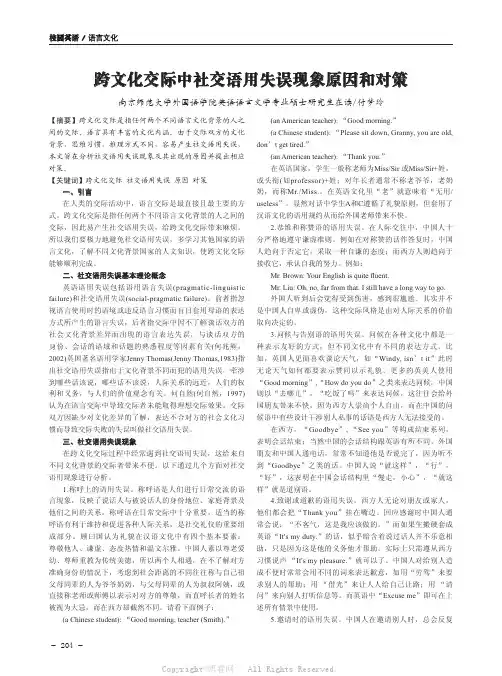
- 204-校园英语 / 语言文化跨文化交际中社交语用失误现象原因和对策南京师范大学外国语学院英语语言文学专业硕士研究生在读/付梦玲【摘要】跨文化交际是指任何两个不同语言文化背景的人之间的交际。
语言具有丰富的文化内涵。
由于交际双方的文化背景,思维习惯,推理方式不同,容易产生社交语用失误,本文旨在分析社交语用失误现象及其出现的原因并提出相应对策。
【关键词】跨文化交际 社交语用失误 原因 对策一、引言在人类的交际活动中,语言交际是最直接且最主要的方式。
跨文化交际是指任何两个不同语言文化背景的人之间的交际,因此易产生社交语用失误,给跨文化交际带来麻烦。
所以我们要极力地避免社交语用失误,多学习其他国家的语言文化,了解不同文化背景国家的人文知识,使跨文化交际能够顺利完成。
二、社交语用失误基本理论概念英语语用失误包括语用语言失误(pragmatic-linguistic failure)和社交语用失误(social-pragmatic failure)。
前者指忽视语言使用时的语境或违反语言习惯而盲目套用母语的表达方式所产生的语言失误,后者指交际中因不了解谈话双方的社会文化背景差异而出现的语言表达失误,与谈话双方的身份、会话的语域和话题的熟悉程度等因素有关(何兆熊,2002)英国著名语用学家Jenny Thomas(Jenny Thomas,1983)指出社交语用失误指由于文化背景不同而犯的语用失误,牵涉到哪些话该说,哪些话不该说,人际关系的远近,人们的权利和义务,与人们的价值观念有关。
何自然(何自然,1997)认为在语言交际中导致交际者未能取得理想交际效果,交际双方因缺少对文化差异的了解,表达不合对方的社会文化习惯而导致交际失败的失误叫做社交语用失误。
三、社交语用失误现象在跨文化交际过程中经常遇到社交语用失误,这给来自不同文化背景的交际者带来不便。
以下通过几个方面对社交语用现象进行分析。
1.称呼上的语用失误。
中日跨文化交际语用失误分析及对策跨文化交际语用失误是交际双方因不理解对方的意图而发生的沟通失误。
通过分析导致中日跨文化交际语用失误的成因,即语言差异、文化背景和习惯差异导致的社交理念差异、以及受文化定势的影响,针对性地提出改进意见,降低中日交流过程中误会发生的可能性。
标签:中日跨文化交际;语用失误;语言;社交理念;文化定势引言近年来,中日两国互赴旅游、留学、工作热潮持续升温。
以中国游客赴日旅游为例,2015年出现了井喷式增长。
日本政府观光局公布的统计资料显示,2015年1月至10月中国大陆赴日游客超428.4万人,较去年同期增长112.9%,中国游客的消费观念也给日本民众以强大的冲击,催生了“爆买”一词,并在年度日本十大流行语票选中拔得头筹〔1〕。
与此同时我们也遗憾的看到,根据凤凰卫视的一档《寰宇大战略》日本智库言论MPU的调查显示,84.3%的日本人对中国印象不佳,而对日本有负面印象的中国人也高达64.5%。
一方面是日益频繁的交际,另一方面是对彼此印象的恶化,两者严重矛盾,长此以往势必影响中日民间交往的健康发展。
中日两国的关系用“一衣带水的邻邦”来形容恰如其分,撇开长久以来的政治恩怨、地缘纠葛,细想起来,飞行距离短且感受不到时差、似曾相似的语言、源远流长的文化渊源、趋近的黄皮肤黑头发,都可以成为两国民众“相熟”并增进感情的理由。
然而事实上中日民众的交际存在诸多文化碰撞下的“水土不服”,又鉴于对这些现象背后深层次的误读,助推了双方在互为差评师的道路上渐行渐远。
本文试图立足于跨文化语用失误角度,探究导致中日交际语用失误的成因,并相应提出改善对策,以期对中日跨文化交际朝着正向发展提供一些参考。
一、跨文化交际语用失误的概念和分类语用失误(Pragmatic Failure)是由英国语言学家托马斯(Jenny Thomas)于上世纪八十年代提出的。
她在“跨文化语用失误”(Cross-cultural Pragmatic Failure)一文中使用了语用失误(Pragmatic Failure),以区别于以往的语用错误(Pragmatic Error)概念。
语用失误及对策 Prepared on 22 November 2020浅析跨文化交际中的语用失误及其应对策略摘要:在跨文化交际时,人们常常理所当然地以本国文化的准则和社会规范作为解释和评价别人行为的标准,这种行为往往造成交际失败,并产生较大的心理或社会距离,即造成语用失误。
可以说,语用问题已经成为跨文化交际顺利进行的障碍。
本文就语用失误中社交语用失误的概念、产生的原因以及应对策略三个方面进行简单的分析和概括,希望能使更多人了解语用失误,并且能正确应对语用失误以实现交际顺利进行。
关键词:跨文化交际;语用失误;文化背景;社会环境Abstract: In cross-cultural communication,people often take it for granted that their own cultural norms and social norms as the standard to explain and evaluate the behavior of behavior often causes communication failure and larger psychological or social can say that pragmatic problems has become the obstacle for the smooth intercultural this paper,I analysis and summary the pragmatic failure simply in three aspects that concept,reasons and to make people know more about pragmatic failure and fix them to make Communication go smoothly.Key word: cross-cultural communication;pragmatic failure;cultural background;social environment 随着世界地球村的形成和中国国力的逐步增强,跨文化交际已成为国际间交往的必须。
-169-文化教育论跨文化社交语用失误及对策赵丹(哈尔滨师范大学&黑龙江东方学院,黑龙江哈尔滨150000)1概述。
随着中国对外开放程度的逐渐深入,西方社会的人和事物越来越多地走进了我们的视野,在这种情况下,跨国域、跨民族、跨文化的经济和社会交往将会与日俱增,这就为我们提供了许多与西方人接触和交往的机会,这对于加深我们对西方社会的理解是一件好事,但这并不是一件简单的事情。
在人类的交际活动中,语言交际是最直接、也是最主要的方式。
用语言进行交际,不仅需要知道语言知识,还需要知道如何使用语言。
跨文化交际是指任何两个不同语言文化背景的人之间的交际。
在跨文化交际中,由于双方文化背景存在差异,常发生文化冲突,这种文化冲突必然反映在作为文化载体的语言上,从而产生语用失误。
英语语用失误包括语用语言失误和社交语用失误:前者是指忽视语言使用时的语境或违反语言习惯而盲目套用母语的表达方式所产生的语言失误;后者是指交际中因不了解或忽视谈话双方的社会文化背景差异而出现的语言表达失误,它与谈话双方的身份、会话的语域和话题的熟悉程度等因素有关。
在大多数情况下,在交际过程中出现的语用失误都属于因文化背景不同而造成的社交语用失误。
2社交语用失误的形成原因和表现形式。
社交语用失误多数是在交际的一方在不使用母语的情况下出现的。
它是由于交际的一方在交际过程中套用了本族文化中不能为对方所接受的社会语用规则或语用参数而造成的,有如下一些情况:2.1不得当的问候和告别方式。
问候和告别是交际的重要方面,使用不得当的语言来问候和告别常常会导致困惑甚至反感。
中国人见了面传统的打招呼的问候语“吃了吗?”或者“你到哪儿去?”而在与初到中国的西方人相遇时问“Have you had yourdinner?”或者“Where are you going ?”会使它们感到困惑:“为什么总问我吃没吃饭?我有钱吃饭。
难道是要邀请我共餐吗?我去哪里是自己的事情,为什么别人要打听?”合适的问候语应该是“Good morning .”“Good afternoon.”等。
语用迁移视角下的跨文化交际失误应对策略
跨文化交际失误是在跨文化交际过程中不可避免的,因为不同的文化有着不同的语言习惯和思维方式。
在语用迁移视角下,跨文化交际失误是由于将自己的语言文化与目标文化的语言文化混淆所导致的。
因此,应对跨文化交际失误需要采取以下策略:
1. 学习目标文化的语言和文化。
了解目标文化的基本价值观、社会规范、礼仪习惯以及表达方式等,可以有助于避免由于语用迁移而导致的交际失误。
2. 尝试理解并尊重对方的语言和文化差异。
对于目标文化中不同于自己的语言习惯和表达方式,尝试理解其背后的文化价值,并尊重对方的习惯和文化。
3. 采用简单、直接和明确的表达方式。
避免使用对方不熟悉的俚语和幽默,如有使用,应解释清楚含义,避免造成误解。
4. 在交际中不断进行确认和澄清。
在交流过程中,应不断确认和澄清双方的语言和行为意义,以避免由于语用迁移而导致的误解和不适当的行为。
5. 建立和谐的跨文化关系。
建立稳定的跨文化关系可以促进双方的相互理解和信任,从而有效减少跨文化交际失误的发生。
论跨文化社交语用失误的文化探源及对策自然先生(1988)认为,“在言语交际中导致交际者本人未能取得完满交际效果的差错统称为语用失误”。
语用失误有时又被称为语用违例(Ninio & Snow,1996)。
语用失误主要表现为说话方式欠妥,或者不符合特定语言和文化社区的表达习惯,或者说话不合时宜等。
需要指出的是语用失误不等于语法错误,错误是可以改正的,失误只能去避免。
在Thomas(1983)看来,在言语交际中,说话人在表达思想时出现语法错误,至多被认为是“说得不好”;但违反交际规则如礼貌原则就会被认为是“举止不好”,被认为是“不真诚的,存心欺骗的或居心不良的人”。
她根据Leech关于语用学的分类,将语用失误分为两类:语用语言失误和社交语用失误。
前者主要是指由语用语言迁移所造成的失误,即把一种语言中语言形式与语言功能的对应关系照搬到另一种语言的使用之中,造成使用中形式与功能的错位。
这类失误还包括因教学所导致的错误,比如在实际生活中用课堂上学的完整句子讲话或回答问题。
而社交语用失误是指交际中因不了解或忽视谈话双方的社会、文化背景差异而出现的语言表达失误。
它与谈话双方的身份、会话的语域、话题的熟悉程度等因素有关。
例如,一位中国学生向外籍教师Johnson打招呼:“Hello!Teacher Johnson.”外藉教师Johnson此时不知道怎么回答;中国学生也很失望,觉得这个外籍老师没有礼貌。
这种误解是由于英汉称呼系统不对应,正确的说法应是直接称呼“Johnson”,或者称呼“Dr.Johnson”、“Prof.Johnson”也是合适的。
此外,笔者观察在中西方人打交道的的时候,中国人最常见的开场白就是“Hello,××.Where are you going?”或者“Have you had your meal?”,这几句表达都是正确形式,但它们却是不合适、不得体的英语。
如果这样去和英语人士对话,说话人会被误解语意甚至被认为是无礼的,是干预别人的隐私。
跨文化交际中的语用失误分析与对策跨越不同文化背景的交际经常会发生故障。
语言学家将人们在言语交际中,因没有达到完满交际效果的差错,统称为语用失误。
本文结合中西文化对比,以英汉语交际为例分析了跨文化交际中的语用失误的原因,并提出了几种避免或克服这种现象的对策。
标签:跨文化交际语用失误对策一、前言近几年来,经济的迅猛发展与技术的飞速进步把我们带到了一个全球化的时代,来自不同文化背景的人际之间的交流也越来越频繁。
值得注意的是,不同的知识背景,甚至同一个信息也会由不同的人理解为不同的意思,这些都会引起交际障碍,这就是交际失败。
这种交际失败导致某人的意图没有真正被对方理解。
然而在跨文化交际中大多数的交际失败都是由语用失误引起的。
正因如此,语用失误的研究对跨文化交际、二语习得等学科有重要意义。
本文结合中西文化对比,以英汉语交际为例分析了跨文化交际中的语用失误的原因,并提出了几种避免或克服这种现象的对策。
为了了解跨文化交际中的语用失误,本文先介绍了跨文化交际和语用失误,并分析了两者之间的联系。
然后本文重点讨论了引起跨文化交际中的语用失误的原因。
最后针对前面所讨论的原因提出了一些相应的对策。
二、跨文化交际不同文化的交际活动随着人类经济和文化的发展而频繁。
有很多方式可以用来表示跨文化交际,如:“intercultural communication”和“cross-cultural communication”,而大多数人们采用“intercultural communication”。
在很多情况下,“intercultural communication”和“cross-cultural communication”是相同的意思,但是Gudykunst和Kim在他们的《跨文化交际理论》的序言中对它们进行了区分,认为前者是不同文化现象的比较,而后者是不同文化背景的人们的相互影响。
“intercultural communication”的研究一般都认为包括“cross-cultural communication”。
最新英语专业全英原创毕业论文,都是近期写作1任务教学法在英语阅读教学中的应用2《红楼梦》中文化词的翻译3论女同性恋成长小说--简析珍妮特.温特森《橘子不是唯一的水果》4王尔德童话中的毁灭与拯救5《夜访吸血鬼》中的模糊性别观6会议交替传译中习语的翻译7交际法在中学英语词汇教学的应用8论《推销员之死》主人公威利洛曼的悲剧9On Freudian Interpretation of Dreams In Sense and Sensibility10英汉称谓语中的文化差异11目的论下英语广告仿拟格的汉译12On Analysis of Jonathan Swift’s Satiric Arts in Gulliver’s Travels13论《月亮和六便士》中的自然主义特色14杰克伦敦对马丁伊登悲剧的影响15课本剧在高中英语教学中的应用与研究16《阿甘正传》承载的美国青年价值观17从女主人公蓓基的人物塑造看《名利场》的社会意义18浅析国际商务谈判文化因素及其对策19文档所公布均英语专业全英原创毕业论文。
原创Q 799 75 79 3820中美企业并购中的文化整合分析21从《远离尘嚣》看托马斯哈代的生态自然观22浅谈我国服装行业的网络营销23浅析中西价值观差异对跨文化交际的影响及其解决方法24论《皮格马利翁》的结局25Double Vision in Characterization in The Great Gatsby26论国际商务非礼貌言语行为27《紫色》的生态女性主义解读28用批评性语言分析中美主要矛盾29从汉英墓志铭看中西生命价值意识之差异30英汉数字习语的文化内涵及其翻译31美国宗教文化及价值观在其外交政策中的体现32影响中学生英语学习的心理因素分析33简析中西方译者翻译《论语》的差异性34The Transcultural Differences in the Translation of Commercial Advertisements35论《儿子与情人》中的父子冲突36论《野性的呼唤》中的自然主义37从合作原则分析《生活大爆炸》中字幕幽默的翻译38从《牧师的黑面纱》中看霍桑对清教主义的认可与反对39The Rose in the “Heights”—An Analysis on Catherine’s Personality in Wuthering Heights 40从社会语言学的视角研究蔑视女性的词汇表达法41解析《喧哗与骚动》中凯蒂悲剧的必然性42Jane Austen’s Opinion towards Marriage in Pride and Prejudice43女性主义视角下《傲慢与偏见》的情态意义解读44中英姓名文化内涵的探究45The Features of Classic-literature-based Movies Showed in Pride and Prejudice46量词“片”与“piece”的语法化对比研究47言语行为理论在戏剧《芭芭拉少校》对白分析中的应用48An Analysis of English Pronunciation Teaching in Elementary Schools49章回体小说开篇叙事标记语翻译初探——以四大古典名著为例50Cultural Differences and Idiomatic Expressions in Translation51 A Pragmatic Analysis of Puns in English Advertisements under the Cooperative Principle 52从谷歌和百度两大企业的管理方式看中美企业文化的差异53英源外来词的翻译方法54苔丝悲剧的原因55应用多媒体资源提高英语新闻听力56肯德基在中国的成功之道57论《德伯家苔丝》中安吉尔行为的合理性58E-learning的理论与实践59浅谈英语科技文献汉译时应注意的几个方面60从《道林•格雷的画像》看王尔德的唯美主义61语码转换———从正式场合到非正式场合62论托尼莫里森《宠儿》的哥特式元素63英语专业学生词汇学习策略特点研究64《大地》中赛珍珠女权主义分析65从《狼图腾》和《野性的呼唤》中狼的意象比较中西方生态意识66信用证中英语语言特点及应用研究67女性主义视域下的《了不起的盖茨比》68从生态女性主义角度解读朱厄特的《白苍鹭》69《可爱的骨头》的电影改编分析70《野性的呼唤》中的自然主义71初中英语教学中的兴趣教学法72从《傲慢与偏见》看简•奥斯丁的婚姻观73中学生英语听力障碍分析与对策74从道德角度分析简•奥斯丁《劝导》中的女主人公安妮•艾略特75扼杀在萌芽中的期许—“一小时里故事”中的女权渴望76从上海迪士尼的兴建看中西文化异同77中美商务谈判的语用策略研究78The Relationship Between Oscar Wilde and Dorian Gray79通过姚木兰和斯嘉丽形象的对比看中西文化的异同80试析诗歌翻译中文化意象的处理81The Application of Task-based Approach to Improving Speaking Ability in Middle School 82浅析《两个新嫁娘》中的不同婚姻观83文化差异对英汉翻译的影响84On the Anti-traditional Factors of Feminism Translation85词块法在高中英语写作教学中的应用86浅谈英汉人体部位的隐喻87从西方讽刺剧看品特的威胁喜剧88 A Brief Analysis of the Main Female Characters in Golden Notebook89中国皮钦语的产生和发展90《雾都孤儿》中的批判现实主义91An Analysis of Mulan's Character in Moment in Peking92英语网络语言特点研究93模糊限制语在求职中的应用研究94班德瑞曲名汉译策略之解析95美的遗失与幻灭——论托妮莫里森小说《最蓝的眼睛》中的黑人世界96《红字》中场景描写及其象征意义97Characteristics of English Slang and Their Social Functions98文化负载词的翻译99论谭恩美《喜福会》中文化身份迷失与探寻100《论语》中“仁”的翻译研究101从《弗洛斯河上的磨坊》看维多利亚时期的新女性主义观102中西文化对红颜色的理解及翻译103艾米莉狄金森诗歌的自然意象104从功能翻译理论浅谈公示语翻译105 Pragmatic Empathy and Chinese-English Translation106《希腊古瓮颂》中的艺术和永恒之美107华盛顿•欧文与陶渊明逃遁思想对比研究108以拉康的镜像理论分析电影《法国中尉的女人》109NBA和CBA的文化差异分析110从功能对等角度看信用证英语的翻译111英语词汇学习策略探析112地理环境影响下的中英谚语差异113针对基础与学习自觉性较低班级的课堂管理114A Tentative Analysis of the Reasons for McDonald’s Success115《了不起的盖茨比》中色彩的象征意义(开题报告+论)116从文化差异角度看谚语的英汉互译:动态对等117浅谈英汉禁忌语的发展118英语电影片名的汉译要求及赏析119An Analysis of Hemingway’s Attitude towards War in For Whom the Bell Tolls 120对《魂断蓝桥》女主角悲惨性命运原因的分析121Sino-American Business Negotiations:An Intercultural Communication Perspective 122从电视相亲节目看当代中美女性婚恋观差异123分析《傲慢与偏见》中女性婚姻的选择124An Analysis of Middlemarch from the Perspective of Ethics125《哈利•波特》系列作品中颜色的象征意义126文化视角下探析刘半农翻译观的嬗变---从《小说大观》到《新青年》127游戏在学前儿童英语教学中的角色及作用128论罗伯特弗罗斯特诗歌的黑色基调---在美国梦里挣扎129非英语专业大学生听力课堂焦虑的影响及解决策略130论文化背景对跨文化英语口语交际效果的影响131法语给英语带来的影响132On“Faithfulness, Expressiveness, Elegance” in Translation of Business Contract133译前准备对交替传译效果的影响134从认知语言学的视角下浅析隐喻和换喻的异同135A Study on Chinglish of EFL Learners in Junior High Schools in China136A Comparative Study of Tess in Tess of the D’Urbervilles and Jane in Jane Eyre137在经济全球化下中西方文化差异与跨文化管理138《睡谷的传说》中理想与现实的矛盾139两种文化中不同的生存希望——以电影《肖申克的救赎》和《活着》人物命运分析为例140从生态批评视角解读《野性的呼唤》141中学英语课堂中教师的纠错策略142房间和风景的象征意义:读福斯特的《看得见风景的房间》143浅析《还乡》中游苔莎的悲剧根源144从功能理论角度分析电影《点球成金》字幕翻译145作家的病态心理对文学创作的影响146汉语无主句英译方法探析147从跨文化角度谈英语词汇的教与学148浅谈英语语言中的性别歧视现象149Harmony is Everything: an Ecological Analysis of The Grapes of Wrath150海丝特与卡米拉爱情观的对比分析151A Comparison of the English Color Terms152从接受美学角度看中英旅游文本的翻译153通过小说《紫色》分析沃克的妇女主义思想154《红字》中丁梅斯代尔的灵魂救赎155双语对认知发展的影响156新闻英语中的委婉语及其翻译策略157论密西西比河对马克吐温和《哈克贝利费恩历险记》的影响158Demystification of Model Minority Theory159英汉思维差异与翻译策略160黑暗中的光明—《蝇王》的主题探析161An Eco-Critical Approach to Moby Dick162英汉谚语的文化对比及翻译163双关语在英语广告中的应用及翻译164中西方礼貌用语的差异165无法挽回的毁灭--欢乐之家女主角莉莉的悲剧166从翻译等值理论看文化词的翻译167读者与作者的断裂——多丽丝•莱辛《金色笔记》中的女权主义解读168英汉问候语对比研究169A Comparison of the English Color Terms170从接受美学角度看中英旅游文本的翻译171The Temptation and Disillusionment of Gatsby’s Pursuit of Dream172从社会习俗角度分析中西方文化差异173A Feministic Study of the Theme of “The Chrysanthemums”(开题报告+论文+文献综述)174175高中英语听力课中的文化教学176公示语翻译的问题及对策研究177《嘉莉妹妹》时代背景下女性的地位178中西跨文化交际中的礼貌问题之比较分析179浅析《掘墓人的女儿》所体现的犹太寻根主题180苔丝死之谜181论《儿子与情人》中保罗的爱情悲剧182《爱玛》女主角爱玛伍德豪斯人物分析183跨文化交际中的语用失误与避免方法184关联理论在公示语英译中的应用185游戏在初中英语教学中的作用186The Analysis of Narrative Techniques in William Faulkner’s “A Rose for Emily”187从制度文明起源的角度浅谈中西方家庭观念的差异188报刊杂志词频分析与大学英语教学中词频分析的比较189论个人主义对美国英雄电影的影响190《石头天使》中哈格形象的女性主义解读191小学英语学习策略及研究192EFL Learning Strategies on Web-based Autonomous Learning193A Comparison of the English Color Terms194反复在格特鲁德斯泰因的作品《三个女人》中的运用195On the C-E Translation of Public Signs196Application of Cooperative Learning to English Reading Instruction in Middle School 197合作原则下幽默的语用分析198《追风筝的人》作为成长小说的的体裁分析199中西酒店文化比较及探讨200论《麦田里的守望者》的意义。